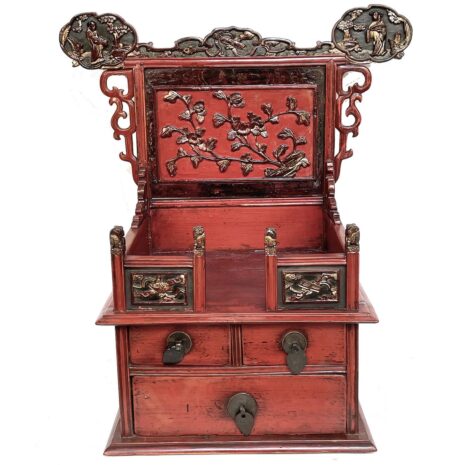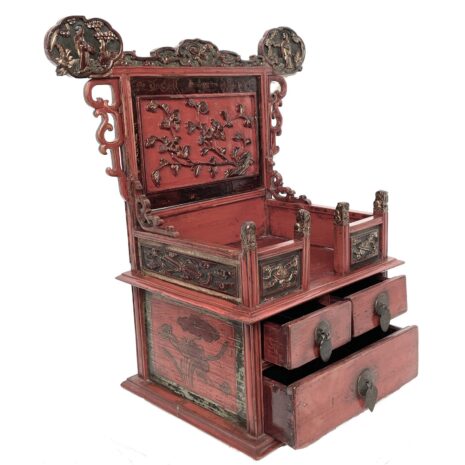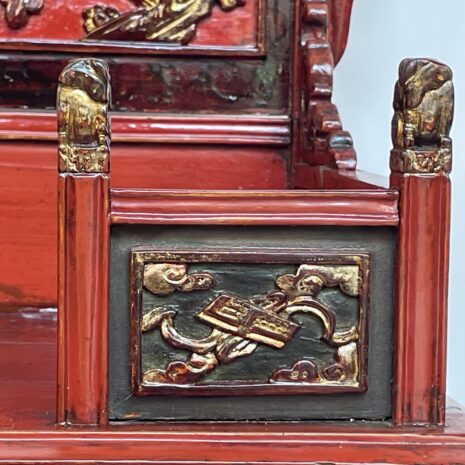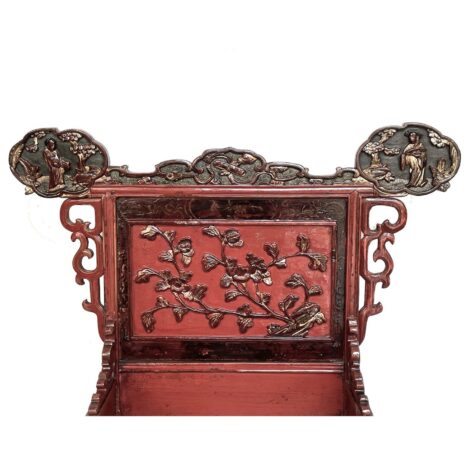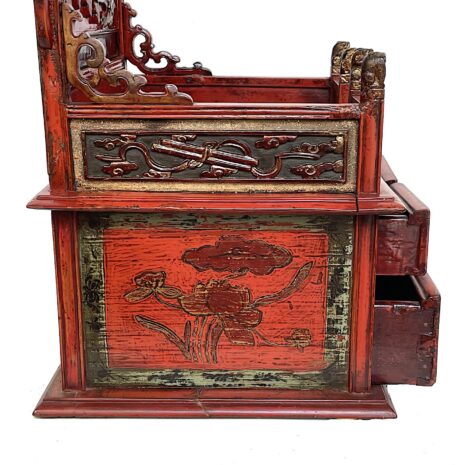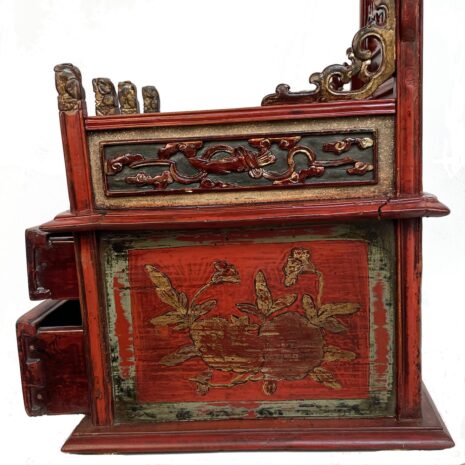Antique Ladies Vanity Cabinet with Elaborate Carving (16442)
Original price was: $695.00.$495.00Current price is: $495.00.
Ht: 20.75” W: 19.125” D: 11” |CALL 213-568-3030 OR EMAIL [email protected] FOR SHIPPING COST
Fine ladies vanity cabinet covered with red lacquer and gold highlights. Parents’ gift to newlyweds with auspicious symbols for happiness, long life and having sons reflecting Confucian belief that producing sons to carry on the family name is essential to happiness.
Description
This elaborate 19th century elmwood vanity cabinet is an example of Chinese vernacular furniture catering to the newly prosperous Chinese merchant class whose colorful tastes countered those of the Ming conservative scholars and the literati imperial class. Covered with red lacquer, the color of blessings (fu), it has deeply carved and painted decorations highlighted with gold with many auspicious symbols to bring happiness, good fortune, long life and many sons to the couple who received it as a wedding gift in the hope of them continuing family traditions.
Many longevity symbols are a wish for the couple to grow old together with many sons in harmony, wealth, high social and political rank and honor. A bat (fu) symbolizes the Five Blessings of longevity, health, wealth, love of virtue and a peaceful death. The center panel has raised reliefs of 5-petal plum blossoms meaning “May the blossoms bring you the Five Blessings.” The four lions on the front panels are protective and propitious, as lions (shi) are strong and powerful, protect building entrances, homes and their inhabitants and symbolize harmony, blessings and high rank. The female in the upper left “wing” stands among stylized pines, symbols of longevity (shou). The female on the right holds a fan, the symbol of the immortal Han Zongli which he uses to awaken the dead and is another wish for a long life. The rolled-up pair of scrolls is one of the Chinese Seven Treasures. Ribbons highlight the magic, heavenly, or divine powers of an object or figure and they are also longevity symbols. The painted bird on the rear is a magpie, a homophone for joy and happiness and its long tail is a pun and wish for longevity . The painted lotuses are Buddhist symbols of purity and enlightenment and symbols of a happy marriage. Lotus seeds are a pun for fertility but, when used with lian it means the continuous bearing of many sons (lianzi). The lotus has many names: hehua which is homophonous with harmony (he), lian, a pun for rising in rank (liansheng), and shui furong, a pun for wealth (fu) and honor (rong). The symbolic motifs made this an ideal wedding gift. In excellent condition.
This piece is included in an instagram post.
Sources
Patricia Bjaaland Welch, Chinese Art: A Guide to Motifs and Visual Imagery, North Clarendon, Tuttle Publishing, 2008.
Terese Tse Bartholomew, Hidden Meanings in Chinese Art, San Francisco, Asian Art Museum of San Francisco, 2006.
Andrea & Lynde McCormick, Chinese Country Antiques: Vernacular Furniture and Accessories, c.1780-1920, Atglen, Shiffer Publishing Ltd., 2000.
Additional information
| Place of Origin | China |
|---|---|
| Period | Antique, Qing Dynasty |
| Date | 19th Century |
| Materials and Technique | Wood |
| Dimensions (inches) | Ht: 20.75” W: 19.125” D: 11” |
| Dimensions (metric) | Ht: 52.71cm W: 52.70cm D: 27.94cm |
| Condition | Excellent, fine patina demonstrating age and use |
| Item Number | 16442LMK |
| Shipping Box Size | Oversized. Call 213-568-3030 or email [email protected] for shipping. |

